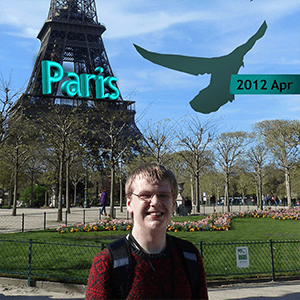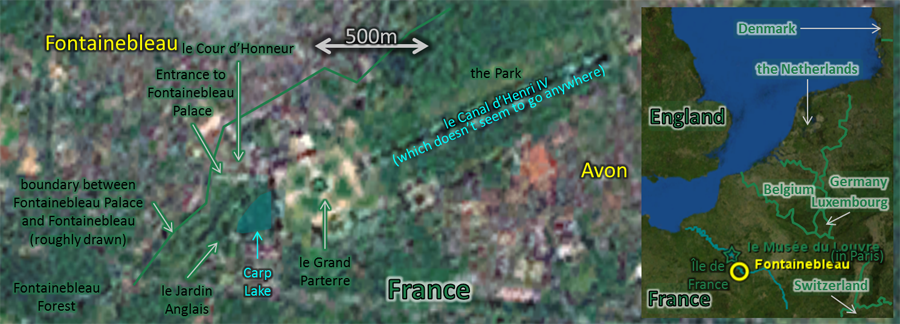 Article for 2012 Apr 05
Article for 2012 Apr 05
Part of the “Paris” series.
2012

2012 Apr
Apr 05 Thu 
Fontainebleau - the fountain of beautiful water (la fontaine de belle eau). In fact it’s a commune (village) south-east of Paris, the only commune in the Île-de-France region with a surface area greater than Paris’. Most famous as a country-retreat for French nobility of yore, Fontainebleau’s two greatest attractions are the Forest of Fontainebleau and le Château de Fontainebleu.
The word “château” in French can either refer to a castle or a grand place of residence for aristocrats (i.e. a palace). The word “palais” also means a grand place of residence for aristocrats; the distinction between the two is that les palais are in the city. (Though the word “palais” is also the French word for the roof of the mouth, the uraniscus, the palate.)
| Rural | Urban | |
|---|---|---|
| Castle | un château | un château 1 |
| Palace | un château | un palais |
| Palate | un palais | un palais |
 Anyway, that’s relevant because we visited Fontainebleau Palace today, after quite a long coach-journey. The interiors were similar to exhibits at the Louvre. (One part of the Louvre had rooms resembling Renaissance bed-rooms.) These rooms were rather splendid and resplendent. But what really excited me was the exteriors: the gardens were a spacious antidote to the claustrophobia of the city. Indeed, one of the gardens, le Grand Parterre (the Big Flower-bed), is the largest formal garden in Europe.
Anyway, that’s relevant because we visited Fontainebleau Palace today, after quite a long coach-journey. The interiors were similar to exhibits at the Louvre. (One part of the Louvre had rooms resembling Renaissance bed-rooms.) These rooms were rather splendid and resplendent. But what really excited me was the exteriors: the gardens were a spacious antidote to the claustrophobia of the city. Indeed, one of the gardens, le Grand Parterre (the Big Flower-bed), is the largest formal garden in Europe.
 Before reaching the Big Flower-bed, we (I and three others) walked around le Cour de la Fontaine. At the heart of this garden was Carp Lake, so called because of its ichthyic inhabitants, its piscine population, its fishy residents.
Before reaching the Big Flower-bed, we (I and three others) walked around le Cour de la Fontaine. At the heart of this garden was Carp Lake, so called because of its ichthyic inhabitants, its piscine population, its fishy residents.
I was more interested in the ducks. And the coots. And the swan. And they swam.
 On the opposite side of Carp Lake from the palace buildings was an entrance to le Jardin Anglais, which was my cue to whistle “English Country Garden”, much to the others’, erm, delight. A robin started to sing soon afterwards.
On the opposite side of Carp Lake from the palace buildings was an entrance to le Jardin Anglais, which was my cue to whistle “English Country Garden”, much to the others’, erm, delight. A robin started to sing soon afterwards.

Returning alongside Carp Lake, we entered le Grand Parterre. It was a big flower-bed. (If grass and another lake count as flowers.) A magpie promenaded on a path. A pied wagtail wagged its tail. Chaffinches chirped, in a French country garden.
On the other side of le Grand Parterre was a view out to a canal that endured to the horizon. We returned to the coach.
Thus, we returned to our accommodation, where I had a happy few hours playing Scrabble against a class-mate called S, who is better at Scrabble than I am at chess (and she is better at chess than I am at Scrabble). We stopped playing after midnight.
Footnote
1 Not quite sure why a castle would be inside a city, given that the castle is supposed to protect the city. It would be like putting a bullet-proof vest inside you (which would be hard to stomach).




